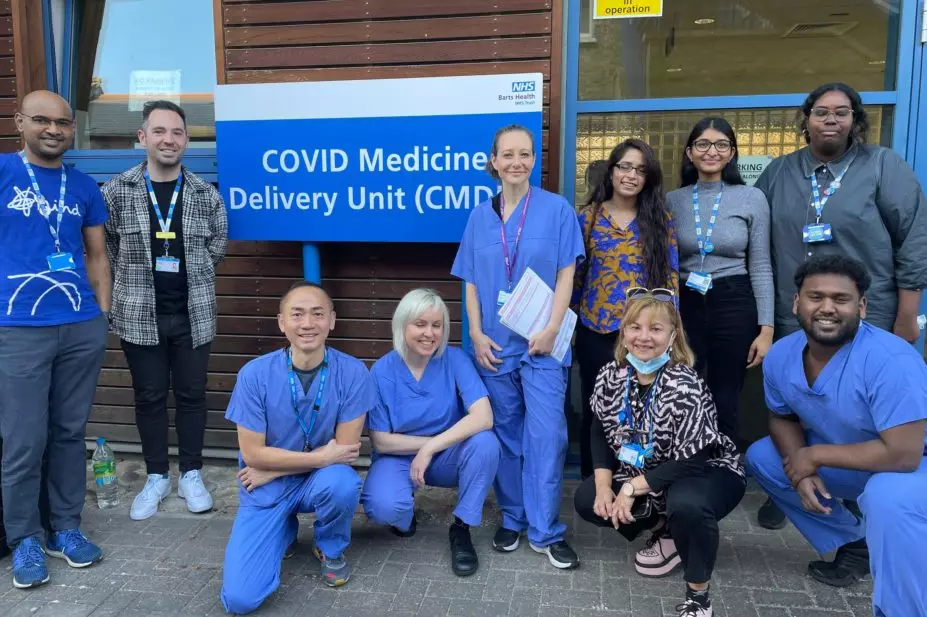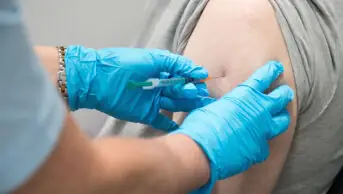
Tejal Patel
On 15 June 2021, NHS England asked all integrated care systems (ICS) across the country to establish local units that would deliver potential COVID-19 therapies to patients. At the time, there was emerging evidence that neutralising monoclonal antibody (nMAB) treatments could protect vulnerable patients from COVID-19, but the UK medicines regulator had not granted marketing authorisation for any of these treatments yet.
Barts Health NHS Trust was identified as the lead provider of the COVID-19 Medicines Delivery Unit (CMDU) for the north east London ICS. As a team, we were already running a vaccination centre at Westfield shopping centre and a vaccination outreach service, but this was a new challenge for us and an opportunity to have an impact on the health of our local population.
The first issue was identifying a suitable location. Those attending would be COVID-positive, so the service had to ensure patients could enter and leave with little contact with other members of the public. We were fortunate to eventually secure a location in a building on the site of Mile End Hospital in east London which, with some adaptations to the ventilation system and the way staff and patients moved around the building, was a perfect home for the CMDU.
Staffing model
The second issue was staffing. Planning for the new service started in August 2021, with an expected opening date of early October 2021, but there was limited information on any staffing model, so we had to create our own.
Then, for various reasons, the timescales for the national rollout slipped to December 2021. This presented us with some challenges because some of the staff who had initially expressed interest had already moved on to other opportunities, leaving us with gaps in our staffing. However, our colleagues rallied round to support the service and this, combined with some additional temporary staffing, meant that we were able to continue with the go-live plans on the 16 December 2021.
We already had more than 70 referrals waiting to be triaged on the day the service went live
The third, and perhaps the most significant, issue we faced was the very high number of referrals we received when the service opened. At the time, cases of the Omicron variant of COVID-19 were rising rapidly and we already had more than 70 referrals waiting to be triaged on the day the service went live. Over the following weeks, particularly over the festive period, the rate of daily referrals continued at a very high level, reaching 217 referrals on New Year’s Eve.
These referrals were significantly higher than the original modelling, meaning that we had insufficient staff to complete the required triaging. This was exacerbated by the Christmas holiday period because many staff who usually would have been available to help were on holiday. However, we managed to secure cover to work with the team to help manage these referrals and they were supported by our excellent nursing and pharmacy team. We were also supported by our clinical commissioning group, which arranged for us to train a group of dentists and nurses to support the referral triaging.
Information gap
Initially, the service was designed to deliver intravenous infusions of neutralising monoclonal antibody (nMAB) treatment sotrovimab to high-risk patients who have had a positive PCR/lateral test. However, we had limited information with which to plan and develop the service throughout.
Ongoing research resulted in CMDUs being asked to also plan to deliver molnupiravir, an oral antiviral medicine that could be delivered to patients in their homes. This request was given just a few weeks before the December go-live date, giving very little time to plan and arrange this. Once again, our pharmacy team rose to the challenge, organising delivery of the drug, training for staff and a contract with a courier service to enable the delivery.
To date, we have triaged nearly 5,000 patients, and treated more than 1,000 patients, with everyone accessing sotrovimab infusion treatment contacted 24 hours post-treatment for follow-up. Of those contacted, a sample of 49 patients were surveyed in early 2022, all providing positive or neutral feedback regarding their recovery trajectory and the care and treatment provided; none reported adverse outcomes.
Quality improvement
Based on initial feedback from patients and staff, a quality improvement project has been initiated to improve patient and staff experience at the CMDU. Based on focus groups, written feedback and workshops, a set of 63 change ideas have been generated, such as improving training for the team, utilising digital technology to streamline services and improving the clinical and work environment.
Baseline data from the feedback surveys submitted in January and February 2022 showed satisfaction scores of 97% for patients and 82% for staff. Further surveys will be completed over the course of 2022 to provide data into the effectiveness of the changes that are being implemented.
Secondary aims include implementing a digital workflow, research on the long-term outcomes of patients post-treatment, as well as looking into those patients who may benefit from treatment but currently fall outside of the current criteria for treatment.
We are really proud of this successful example of interprofessional practice, and the opportunities it has given for system-wide learning. Implementing a new clinical service at a new site may feel overwhelming, but it can also be exciting. We have found that open communication with all key stakeholders was important and recognising that it may take a considerable amount of time for the team to become fully integrated into the clinic. If you have a clear vision for the clinical role of the site, and are able to establish a successful learning environment, you can succeed.
Tejal Patel is head of pharmacy; Suzette Fernandes is operational manager; Jon Dalton is service manager; and Rachel Evans is matron for CMDU services, all at Barts Health NHS Trust


